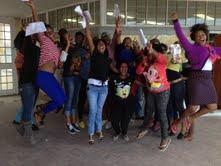

On Thursday 3 January the grade 12 results were released by the Western Cape Education Department and Makhaza achieved an 82% pass rate, up from 55% in 2011. This was testament to the hard work done by the learners and the tutors at the branch.
10 of the learners achieved Bachelor passes with 1 level 7 (83%) pass in Economics, 2 level 6 (71%) passes in Mathematics, 1 level 6 (71%) pass in Mathematical Literacy, 1 level 6 (76%) pass in Life Sciences and 1 level 6 (74%) pass in Accounting. 8 learners achieved Diploma passes and 5 learners Higher Certificate passes. The 5 learners that did not pass the exams all qualified for supplementary exams and we hope that Makhaza will have a 100% pass come the end of the supplementary exams.
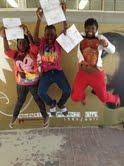
Yibanathi Phaphu, one of the top achievers said that he still couldn’t believe that he passed so well and that he is waiting for the feeling to sink in. He also said that he is looking forward to starting university where he will be doing a B. Comm degree, as he would like to be a Chartered Accountant, at the University of the Western Cape and didn’t expect to get Bs but that he just worked very hard. Sisabelo Pama another top achiever was really excited and couldn’t stop smiling and indicated that she will be pursuing a qualification in Electrical Engineering at Cape Peninsula University of Technology. Nomasomi Gugushe scored 83% for Economics and is planning to study construction management at CPUT. She said “I believe without IkamvaYouth I wouldn’t have passed my grade 12 like I did”.
The day was also marked by a bit of sadness, as we would have loved to see all the matriculants pass first time around, but mostly with joy as learners, parents, staff and tutors all celebrated the successes. The results also bear testament of what the learners are capable of when they really want to do something. In 2011 Makhaza had a lot of difficulties, with the office being petrol-bombed during service delivery protests and the teacher strikes that interupted the school year, but the matriculants of 2012 built on these difficulties and showed that they can achieve and do well even in the face of adversity.
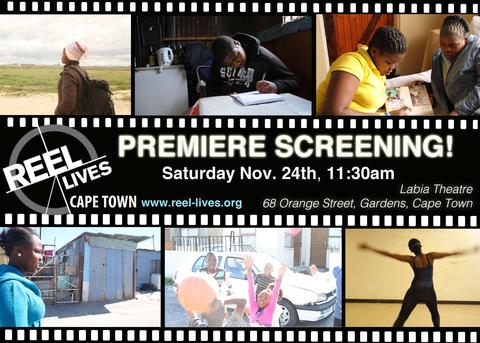
The past three months have seen a few of the Nyanga and Makhaza learners turn into local short film documentary film makers – learning valuable industry skills, while grappling with real issues they face in their lives. Partnering with a US based organisation,
Reel Lives, who use
filmaking media to support education, empowerment and social change.
Each of our learners in the program shot and edited an individual, non-fiction film related to a personal human rights issue in their own lives. Through the process of making these films, they were supported in engaging with their own lives in a unique way, and in experiencing the catharsis of an informal, but powerful, art therapy structure.
Have a look at their teasers, as well as read about the process and what they’ve got up to over the past three months here.
And now please join us in supporting our learners for the premiere of their films!
Saturday November 24th, 11:30am (doors open @ 11am. Please arrive early, limited seating)
Labia Theatre, 68 Orange Street, Gardens, Cape Town
FREE entry, Donations appreciated.
We look forward to seeing you there, please feel free to bring along partners / friends / family
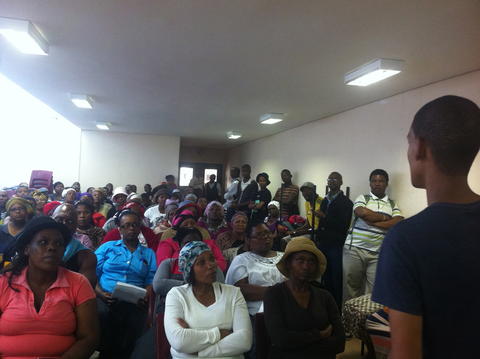

The big number of parents that attended, showed the willingness and dedication these parents have for their children’s education.
At the meeting a number of issues were discussed with some of the more important issues being the role IkamvaYouth plays, attendance, the IY mission and vision, the benefits of being part of IY, report collection and tertiary placements for 2012 grade 12s. The parents also spoke about their experiences of the program, the concerns they have and how all the different projects and tutoring plays a role in shaping the lives of their children. The parents were excited about what their children are doing at Ikamva Youth and also looked forward to reaping the rewards and sharing in the successes of their children.
Also part of the meeting was the tutors who had opportunity to voice their opinions, concerns and successes they had while tutoring this year. One thing that stood out was the willingness of everyone present to make this program a success. One parent noted that this is one of the very few organisations that add value to her child as well as her life. She said that education is key in fighting poverty and finding a way out of township life and thanked IkamvaYouth for accepting her child in the programme. A grade 12 parent noted that money is one of the biggest stumbling blocks that keep their children from going to university and through IkamvaYouth’s involvement and our endeavors in helping students get bursaries, paying the application and registration fees, we are helping to make their dreams a reality.
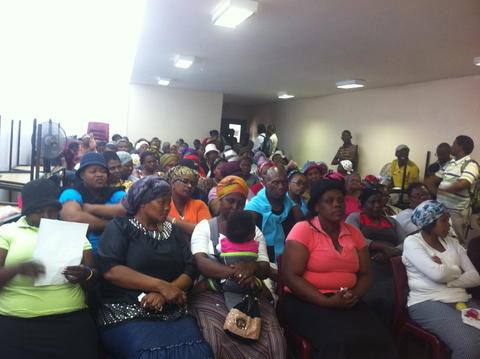
The success of our programme is directly linked to the involvement of parents and through the interaction at the meeting we realised that the future of this beautiful country is looking bright. There is a willingness of people everywhere to make a difference and once a vision is shared it becomes a reality. Success breeds success and this saying was proved at the meeting. If everyone plays their role, no matter how small and insignificant they might think it is, change is possible.
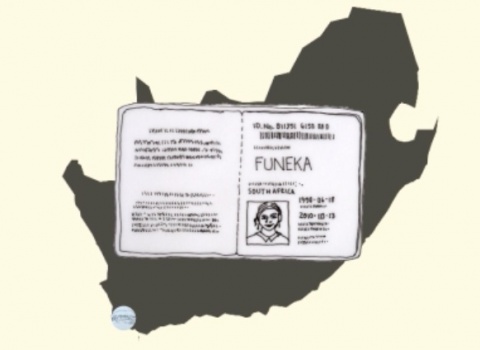
Inspired by the National Planning Commission’s story of Thandi, which Trevor Manuel told as a way to depict the key challenges facing the country, IkamvaYouth has launched Funeka’s Story, which explains IkamvaYouth model and its impact, and sends out a call for volunteers and supporters.
[video:http://youtu.be/NEFflXglk28 align:center]
A BIG UP THANK YOU to:
* Funeka, for sharing your story and being such a professional voice-over artist!
* Capitec for availing Funeka during work hours to go to the sound studio
* Dan Eppel who recorded and mixed the sound
* Freshly Ground for donating the tunes
* the staff and interns who helped behind the scenes,
and especially to:
* Lynne Stuart (@ideainaforest) for applying her design talents to explain what we do so concisely and beautifully!


(Listen to the actual debate at http://www.bbc.co.uk/radio/player/p00x8h4d)
Ikamvanites in Gauteng were invited to take part in the BBC Africa Debate at the University of the Witwatersrand on the 31st of August. The question posed was: South Africa at 18- Does black and white still matter in the rainbow nation? (Unfortunately, due to the nature of the topic and the manner in which BBC radio created the racial references, this article will also be using such terms.)
The debate was hosted by BBC radio presenters, Audrey Brown and Karen Allen, and a panel of speakers selected by BBC in an attempt to represent the “Born Free Generation” as people born on or post 1994. The panel was a strategized mix of Black and White persons from St Benedict’s Private School, Pretoria Boy’s High and Wits Students in an attempt to represent “all” youth. The audience consisted of political party representatives, organisations like Ikamva Youth and academics.
The panellists were divided both racially and with their opinions. However, their opinions were not divided according to race as predicted. Throughout the debate, depending on one’s personal background, circles of influence, experiences and current state of affairs, people felt and saw things differently.
Some youth stated that race does still matter and is still used as a form of identifying and relating to people – finding a commonness (based on cultural, linguistic and socio-economic) amongst a diversified crowd and finding it easier to socialise better with people who have the same social backgrounds. Is this based on the fear of rejection and the need for belonging that most humans feel? On the other hand, as highlighted by the presenters, race is possibly merely used as a code to cover up other issues, such as how race is experienced on a social level. It was great to see that after the debate, the IkamvaYouth learners, also Born Free, interacted with people outside of their normal circle – spreading their horizons.
Some of the issues raised involved nationalisation,education and poverty. A poll was raised and showed that the majority of the attendees were against nationalisation. In terms of the economy, some ‘Born Free’ learners argued that the need is for South Africa to focus on the mines and entrepreneurs to grow the national economy in order to develop society. The issue of shared wealth was then raised and with this race dimensions came up again. A majority of the audience share the view that the majority of poor people are black because the majority of South Africans are black and it is an underdeveloped country – hence the poverty. However, many still see it as: Black people are poor because they are black and financial status is a racial issue construed by the past racial injustices.
Most issues that were given attention were national issues. Policies of Apartheid reformation such as Affirmative Action, BEE and the Constitution were brought up and their role in healing the racial divide were questioned. Unemployment and access to equal opportunities is an evident issue that maintains the gap between the rich and poor. With statistics showing that South Africa has overtaken Brazil GINI ratio – wealthiest. White per capita is 8 times more than black per capita.
This shows that real issues facing South Africans are issues of inequality based on many issues with race only being a structural component created by history and inherently inherited.It was largely seen that differences in race still matters only because South Africans make it matter. All the views of participants were forcibly related to racialism and were rarely from a personal experience of injustice. It seems that society continues to insist on segregation economically, linguistically, geographically and ethnically. One of the audience members noted that: ‘the rainbow colours never mix’, maybe it is inherently human nature to distinguish through separation rather than taking advantage of differences to enhance the whole. There is a shared fear of being different because South Africans were once forced to be different based on race only. The question posed was: when will South Africans stop being forced as well as force ourselves to view one another as Black and White?
IkamvaYouth is at the core at tackling these issues and is a community that is aware, wants to be heard and has the power to make a greater change – The views many Ikamvanites have are from a personal and sincere point of view. These views matter and make issues and discussions more linked to the humaneness of the issues people face on their daily lives.

Ikamvanites, Speak Out! Only you can represent your views with the intensity that they should be viewed. If you feel strong about something – Shout!
Thank you IkamvaYouth for showing us that our voice matters!
Written by Kihisha Suleman (Volunteer in charge of Career Guidance at Ebony Park)
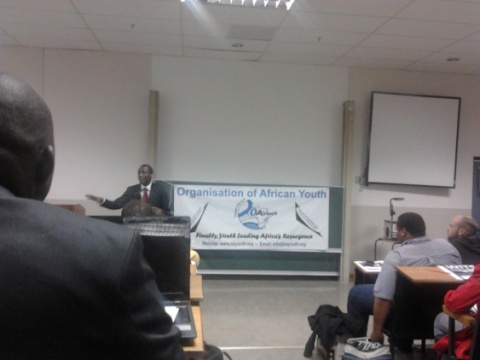
The event, which took place on the 18th of August, was an attempt at creating a platform for the youth as individuals, and representing organisations, to discuss issues and challenges facing South Africa, and contribute in generating solutions. The event was hosted by the Organisation of African Youth, in partnership with the Wits Disability Unit and The Consulting Academy.
The Symposium, the first of many that shall foster platform for the youth to begin setting the agenda and enabling environment to discuss issues affecting the country as a whole, and not remain pedestrian by-standers in issues of national interest. According to the official guest speaker, Patson Malisa,”We (the youth) are the most important component towards the change and revival of the African Continent,”.
As the crowd discussions commenced, the audience still referred to “they” and “I” rather than forming a collective group of responsible youth. Patson highlighted the importance of values such as selflessness and the power of united voice as the youth.

A freelance journalist for Mail & Guardian attended the event and was in search for answers. I took a leap to market IkamvaYouth and told him the importance of the event, and that IkamvaYouth as an organisation consisted of youths that are motivated to resolve issues surrounding the education crisis in South Africa. I informed that the IkamvaYouth model has seen a by-the-youth, for-the-youth revolution in education for all beneficiaries and volunteers.
Representatives of other organisations such as Africa Tycoon and Pretoria Boy’s High provided their perspectives. The lack of leadership was addressed and seen as due to a lack of responsibility and the issues of leaders of the majority being chosen by the minority.
The second issue raised for discussion looked into the gap between the rich and poor. I personally gave insight, stating that the problem lies with a misconception of the meaning of wealth as “What others have that I do not have”. I then provided an alternative school of thought based on the concept of individuals needing to define their own meaning of wealth to attain their personal success. Similarly, one academia stated that the term ‘rich’ must be measured in terms of productivity as that is a true reflection of the attained resources.

The Symposium was a great attempt to a solution driven platform by the youth. While there remains a long way to go in achieving a holistic dimension to contributing to making our country and Africa a better place for everyone, the small efforts of helping one learner at a time as we do at IkamvaYouth is a great step that must never be despised. As the youth, we have what it takes to address all the ills affecting our communities, if only we can be a united front to this end!!
-Kihisha Suleman-











 Lloyd Lungu
Lloyd Lungu